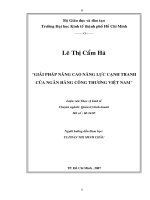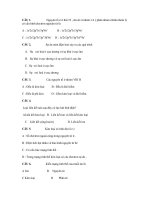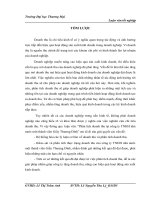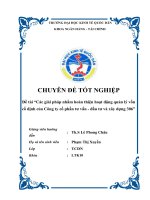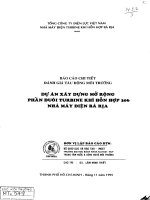GCSE 306
Bạn đang xem bản rút gọn của tài liệu. Xem và tải ngay bản đầy đủ của tài liệu tại đây (71.42 KB, 5 trang )
SƠ GD&ĐT VINH PHUC
TRƯƠNG THPT LIÊN SƠN
(Đề thi gồm: 05 trang)
ĐỀ KTCL ƠN THI THPT QUỐC GIA NĂM 20182019
Mơn: TIẾNG ANH – ĐỀ SỐ 306
Thời gian làm bài: 60 phút, không kể thời gian phát
đề
Ho va tên thi sinh:……………………………………………………………………. SBD:…………………………
Mark the letter A, B, C, or D on your answer sheet to indicate the word(s) CLOSEST in meaning
to the underlined word(s) in each of the following questions.
Question 01: Dad's all fingers and thumbs today. He’s dropped three plates.
A. awkward with hands
B. too busy
C. well-adjusted
D. so embarrassed
Question 02: An increasingly ill-tempered match saw three players sent off before half-time.
A. irritated
B. anxious
C. vexed
D. easily annoyed
Mark the letter A, B, C, or D on your answer sheet to indicate the word whose underlined part
differs from the other three in pronunciation in each of the following questions.
Question 03: A. caught
B. daughter
C. laughter
D. launch
Question 04: A. phase
B. case
C. base
D. vase
Mark the letter A, B, C, or D on your answer sheet to indicate the correct answer to each of the
following questions.
Question 05: The chairman requested that________.
A. the members study the problem more carefully
B. the problem was more carefulness studied
C. the members studied more carefully the problem
D. with more carefulness the problem could be studied
Question 06: Let us know as soon as possible so that we can start________ arrangements.
A. fixing
B. doing
C. making
D. having
Question 07: The interference on the radio was________ by weather conditions.
A. raised
B. done
C. made
D. caused
Question 08: Everyone in the department was________ with the sack unless they worked harder.
A. threatened B. warned
C. bribed
D. prom ised
Question 09: The operating principles of the telephone are________ they were in the nineteenth
century,
A. the same today
B. the same today as C. today what the same
D. the same as today
Question 10: A bridge must be strong enough to support its own weight________ the weight of the
people and vehicles that use it.
A. as well as
B. so well as
C. as long as
D. as far as
Question 11: California relies heavily on income from fruit crops, and________.
A. Florida is as well B. Florida also
C. Florida too
D. so does Florida
Question 12: I must take this watch to be repaired as it________ over 20 minutes a day.
A. progresses
B. accelerates
C. increases
D. gains
Question 13: The hall was very crowded with over a hundred people________ into it.
A. pushed
B. stuffed
C. stuck
D. packed
Question 14: We have arranged special insurance to cover medical________ in the event of an
accident.
A. money
B. accounts
C. expenses
D. prices
Question 15: I can’t see us beating them at tennis this year. We are so out of________.
A. breath
B. step
C. practice
D. fitness
Question 16: I was talking to my aunt when suddenly my cousin George______ in on our
conversation.
A. went
B. intervened
C. interrupted
D. broke
Question 17: I hope this headache will________ soon.
A. pass away
B. come away
C. wear off
D. go out
Question 18: Last night Jim had 2 big burgers for dinner and he felt a bit sick________.
A. lately
B. afterwards
C. backward
D. before
Question 19: ________ swimming is considered to be________ good way of losing weight.
A. Ø/ a
B. The/ a
C. A/ the
D. The/ the
Mark the letter A, B, C, or D on your answer sheet to indicate the word(s) OPPOSITE in
meaning to the underlined word(s) in each of the following questions.
Question 20: The trains go by at a hell of a lick.
A. loitering
B. wind-sweeping
C. very slowly
D. lightning-fast
Question 21: He's still wet behind the ears, unqualified for the promotion.
A. sophisticated
B. age-old
C. home and dry
D. weather-beaten
Mark the letter A, B, C, or D on your answer sheet to indicate the word that differs from the
other three in the position of primary stress in each of the following questions.
Question 22: A. industrial
B. sensitivity
C. beneficial
D. accidental
Question 23: A. reliable
B. memorial
C. admirable
D. desirable
Mark the letter A, B, C, or D on your answer sheet to indicate the underlined part that needs
correction in each of the following questions.
Question 24: Melting glaciers may account the rise in sea level that has taken place during this
century.
A. in sea level
B. may account
C. Melting
D. has taken place
Question 25: The company has so little money that it can’t hardly operate any more.
A. can’t hardly
B. that
C. so little
D. has
Question 26: The children were playing last night outdoors when it began to rain very hard.
A. began
B. were playing
C. to rain very hard D. last night outdoors
Read the following passage and mark the letter A, B, C, or D on your answer sheet to indicate
the correct word or phrase that best fits each of the numbered blanks from 27 to 31.
Enzymes are often called ‘biological catalysts’, and their job is to (27)________ up chemical
reactions. You are full of dissolved chemicals with the potential to come together or break
(28)________ to form the biological building blocks that you need to stay (29)________, but the
reactions happen too slowly on their own.
Enzymes are molecules with ‘active sites’ that lock on to other molecules, bringing them
close together so that they can react, or bending their structures so that they can combine or
break apart more easily. The enzymes themselves do not actually get in the reactions; they just
help them to happen faster. Some of the most well-known enzymes are the ones in your digestive
system. These are important for breaking down the molecules in your (30)________. However, these
aren’t the only enzymes in your body. There are others responsible for building molecules,
snipping molecules, tidying up when molecules are no longer needed, and (31)________ destroying
invading pathogens.
[Adapted from: "A-Z Of The Human Body", Future Publishing Limited,
2016]
Question 27: A. speed
B. look
C. put
D. close
Question 28: A. apart
B. onto
C. off
D. through
Question 29: A. fixed
B. alive
C. existent
D. open
Question 30: A. mouth
B. food
C. tissues
D. pores
Question 31: A. at least
B. even
C. thus
D. more
Read the following passage and mark the letter A, B, C, or D on your answer sheet to indicate
the correct answer to each of the questions from 32 to 36.
Application for admission to the Graduate School at this university must be made on forms
provided by the Director of Admission. An applicant whose undergraduate work was done at
another institution should request that two copies of undergraduate transcripts and degrees be
sent directly to the Dean of the Graduate School. Both the application and the transcripts must be
on file at least one month prior to the registration date, and must be accompanied by a nonrefundable ten-dollar check or money order to cover the cost of processing the application.
Students who have already been admitted to the Graduate School but were not enrolled
during the previous semester should reapply for admission using a special short form available in
the office of the Graduate School. It is not necessary for students who have previously been denied
admission to resubmit transcripts; however, new application forms must accompany all requests
for reconsideration. Applications should be submitted at least eight weeks in advance of the
session in which the student wishes to enroll. Students whose applications are received after the
deadline may be considered for admission as non-degree students, and may enroll for six credit
hours. Non-degree status must be changed prior to the completion of the first semester of study,
however.
An undergraduate student of this university who has senior status and is within ten credit
hours of completing all requirements for graduation may register for graduate work with the
recommendation of the chairperson of the department and the approval of the Dean of the
Graduate School.
Question 32: What is the author's main point?
A. How to make application for graduation.
B. How to obtain senior status.
C. How to apply to the Graduate School. D. How to register for graduate coursework.
Question 33: Where would this passage most probably be found?
A. In a university catalog
B. In a travel folder C. In a textbook
D. In a newspaper
Question 34: The word “semester” in the passage is closest meaning to_____________.
A. term
B. student
C. year
D. school
Question 35: The word “deadline” in the passage is closest meaning to_____________.
A. closing ceremony B. unexpired
C. closing date
D. opening ceremony
Question 36: The phrase “in advance of” in the second paragraph is closest in meaning to ________.
A. into
B. after the end of C. on either side of D. prior to
Mark the letter A, B, C, or D on your answer sheet to indicate the sentence that is closest in
meaning to each of the following questions.
Question 37: I'm grateful that you looked after my garden so well.
A. Thank you because you looked after my child so well.
B. Thank you for looking after my garden so well.
C. Thank you about looking after my garden so well.
D. Thank you that you looked after my garden so well.
Question 38: The meeting was put off because of pressure of time.
A. There was not enough time to hold the meeting.
B. People wanted to get away, so the meeting began early.
C. The meeting is planned to start in a short time.
D. The meeting lasted much longer than usual.
Question 39: She didn’t work hard enough, so she lost her job.
A. The reason why she lost her job was she didn’t work hard enough.
B. The reason for her to lose her job was that she didn’t work hard enough.
C. The reason she lost her job was because she didn’t work hard enough.
D. The reason she lost her job was that she didn’t work hard enough.
Mark the letter A, B, C, or D on your answer sheet to indicate the sentence that best completes
each of the following exchanges.
Question 40: ~ A: "Why've you got such a long face?"
~ B: "__________________"
A. Well, I didn’t sleep well last night.
B. No problem. I’ll help you to make it up in a moment.
C. My boyfriend doesn't want to see me any more.
D. Oh, this exhausting work’s cut me dead.
Question 41: ~ A: "__________________"
~ B: "Oh, dear. It’s nothing serious, I hope.
A. My house was broken in last night. B. John can't play today. It seems he's had an
accident.
C. I’ve lost my wallet coming here.
D. I got my dress torn climbing over the fence.
Read the following passage and mark the letter A, B, C, or D on your answer sheet to indicate
the correct answer to each of the questions.
Etymologically, anthropology is the science of humans. In fact, however, it is only one of the
sciences of humans, bringing together those disciplines the common aims of which are to describe
human beings and explain them on the basis of the biological and cultural characteristics of the
populations among which they are distributed and to emphasize, through time, the differences
and variations of these populations. The concept of race, on the one hand, and that of culture, on
the other, have received special attention; and although their meaning is still subject to debate,
these terms are doubtless the most common of those in the anthropologist's vocabulary.
Anthropology, which is concerned with the study of human differences, was born after the
Age of Discovery had opened up societies that had remained outside the technological civilization
of the modern West. In fact, the field of research was at first restricted to those societies that had
been given one unsatisfactory label after another, "savage," "primitive," "tribal", "traditional" or
even "proliferate," "prehistorical" and so on. What such societies had in common, above all, was
being the most "different" or the most foreign to the anthropologist; and in the early phases of
anthropology, the anthropologists were always European or North American. The distance
between the researcher and the object of his study has been a characteristic of anthropological
research; it has been said of the anthropologist that he was the “astronomer of the sciences of
man."
Anthropologists today study more than just primitive societies. Their research extends not
only to village communities within modern societies but also to cities, even to industrial
enterprises. Nevertheless, anthropology’s first field of research, and the one that perhaps remains
the most important, shaped its specific point of view with regard to the other sciences of man and
defined its theme. If, in particular, it is concerned with generalizing about patterns of human
behaviour seen in all their dimensions and with achieving a total description of social and cultural
phenomena, this is because anthropology has observed small-scale societies, which are simpler or
at least more homogeneous than modern societies and which change at a slower pace. Thus, they
are easier to see whole.
What has just been said refers especially to the branch of anthropology concerned with the
cultural characteristics of man? Anthropology has, in fact, gradually divided itself into two major
spheres, the study of man’s biological characteristics and the study of his cultural characteristics.
The reasons for this split are manifold, one being the rejection of the initial mistakes regarding
correlations between race and culture. More generally speaking, the vast field of 19 th century
anthropology was subdivided into a series of increasingly specialized disciplines, using their own
methods and techniques that were given different labels according to national traditions.
Question 42: It is mentioned in the passage that the split of anthropology into two major areas is
partly due to_________.
A. more knowledge to be gained
B. the development of the sciences of humans
C. the interpretation of race and culture D. the development of modem anthropology
Question 43: According to the passage, modern anthropologist study_________.
A. both primitive and modern societies
B. both communities and modern societies
C. only modern industrial enterprises
D. only primitive and tribal societies
Question 44: According to the passage, anthropology is most likely defined as the study of_________.
A. the biological and cultural characteristics of human beings vocabulary.
B. the lives of peoples all over the world
C. one of the sciences of humans
D. the distribution of human beings the world over
Question 45: Which of the following is NOT mentioned in the passage?
A. Anthropology has been subdivided into specialized disciplines
B. Anthropology gives special attention to the concept of race
C. Anthropology is concerned with the study of human differences.
D. Anthropologists are agreed on the meaning of race and culture.
Question 46: The phrase "first field of research" in paragraph 3 most likely refers to the study
of_________.
A. primitive societies B. industrial societies
C. modern societies D. large societies
Question 47: It can be inferred from the passage that anthropology was first developed in_________.
A. some primitive societies
B. some prehistoric societies
C. Some tribal societies
D. Europe and North America
Question 48: It is mentioned in the passage that anthropology began to divide into various
disciplines in.....
A. the 19th century B. the Age of Discovery
C. prehistoric
D. the 20th century
Mark the letter A, B, C, or D on your answer sheet to indicate the sentence that best combines
each pair of sentences in the following questions.
Question 49: I can’t find the letter anywhere. I'm sure someone has thrown it away.
A. I can’t find the letter anywhere since it must have been thrown away.
B. I can’t find the letter anywhere, so it was sure to have been thrown away.
C. I can’t find the letter anywhere, for it has been thrown away.
D. I can’t find the letter anywhere because it must be thrown away.
Question 50: He loved her so much. He didn’t forgive her for what she had done.
A. He’d forgiven her for what she had done as he loved her much.
B. Much as he loved her, he didn’t forgive her for what she had done.
C. She didn’t love him as much as he loved her.
D. He didn’t forgive her for what she had done because she didn’t love him as much.
_________THE END__________

